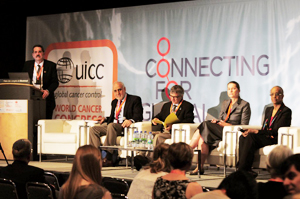Making vital connections
Partnership perspectives on the 2012 World Cancer Congress
October 25, 2012

Before even packing his bag to return home from the World Cancer Congress this past August, Jon Kerner knew two things. First, with over 2,000 cancer leaders from 125 countries this three-day Montreal event was a success for global cancer control efforts. Second, Canada’s collaborative approach to cancer control had made a strong impression on the international delegates.
“The Congress was a marvelous opportunity to network, exchange knowledge and perspectives,” says Dr. Kerner, Senior Scientific Lead for Population Health & Knowledge Management with the Canadian Partnership Against Cancer. “To learn what others were doing around the world and to see how that can advance your own work was truly valuable. The Canadian contribution was significant as well. From the opening panel discussion through to plenary sessions and displays at the global village, Canada’s collaborative cancer control model was being profiled in many sessions and drew great international recognition and appreciation.”
Dr. Heather Bryant, Vice President of Cancer Programs, Clinical and Population Health with the Partnership, and co-Chair of the Congress’ Scientific Programme Committee, highlighted that providing opportunities for knowledge exchange and for attendees to come away with a broader perspective of global cancer control efforts were primary intents for the Congress.
“The symposia and break-out sessions were designed to fit together as a story about international cancer control, and to bring forward a range of perspectives. When people left a session they came out with a better, more complete understanding of the topic at hand, be it cancer prevention or personalized medicine, but they also had a broader understanding of the overall picture of cancer control efforts around the world,” says Dr. Bryant, who was recently elected to the UICC’s Board of Directors, joining President and fellow Canadian Dr. Mary Gospodarowicz, Medical Director at Princess Margaret Hospital.
For Lee Fairclough, Vice-President, Strategy, Knowledge Management and Delivery with the Partnership, Congress activities led her to reflect on the Canadian experience and expertise.
“Canada’s hosting of this event came at a critical juncture for cancer control efforts in Canada. I was struck both by the Canadian presence at the Congress and how far we’ve come in the last six years since the Partnership and the cancer community began to implement the Canadian Strategy for Cancer Control,” she says. “There is cohesiveness in Canada because of our coordinated approach and a connection between organizations and experts, which supports our progress in reducing incidence and mortality and improving quality of life for those with cancer. Together, we’re building a competency from which other nations can benefit, and we have a responsibility to share not only what we’re doing but how we’re doing it.”
Likewise, the Congress was also an opportunity to learn from the work taking place in other countries.
“Many countries with emerging economies are moving their cancer care programs forward in leaps and bounds,” adds Ms. Fairclough. “In some African countries for example, where securing professionals is a significant barrier, from the get-go they’re using telepathology as a way to access new expertise required to deliver cancer care. That kind of innovative progress could effect our own approaches to providing care across our vast geography.”
For Dr. Bryant, the Congress delivered on its promise. “This conference moved beyond profiling individual experts’ or organizations’ progress and made significant headway in tying together the excellent work taking place across the country and around the world. By focusing on building upon one another’s efforts, I feel we really moved the bar forward and contributed to global efforts to reduce the impact of cancer.”
The next World Cancer Congress takes place in Australia in 2014.
